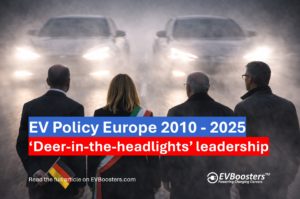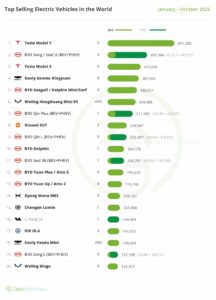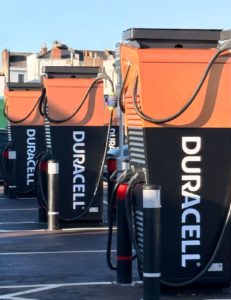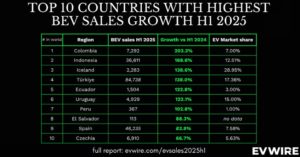Shaping a business and a new industry at the
same time…
Some people build businesses, others shape entire industries….

Christian Hahn has done both. As the CEO of Hubject, he has played a pivotal role in establishing e-roaming as an industry standard, connecting businesses and enabling seamless electric vehicle charging worldwide.
Leading a company from startup to global scale-up is a journey of highs and lows. Over the past decade, Christian has faced tough decisions, built a leadership team capable of scaling, and balanced stakeholders’ expectations in an ever-changing market.
In this conversation with Paul Jan Jacobs, founder of EVBoosters, Christian goes beyond business strategies to discuss the personal sacrifices, lessons learned, and defining moments that have shaped his leadership journey. This interview provides a rare insight into the mind of a leader who is not just building a company, but also constantly evolving himself.
Let’s start from the beginning. When you were a child, what did you dream of becoming?
Christian: If I go back to when I was eight, the Berlin Wall was still standing, and I lived in East Germany. Back then, becoming an engineer was one of the most respected career paths, so I thought about that. But as I grew older, I had very different plans—I didn’t want a job where I had to deal with IT or financials, and I definitely didn’t want to wear a suit every day. Funny how life works, right? Now my daily work is full of financials, IT discussions, and yes, plenty of suits.
And how did your career unfold from there?
Christian: After the fall of the Berlin Wall, everything changed. I went on to study
economic engineering because I liked the idea of understanding the bigger picture. I was always fascinated by the automotive industry, but I also had a strong interest in environmental studies. My first job was at PwC, focusing on energy markets. That’s where I got my first touchpoints with e-Mobility in 2009 —back when it was still an abstract concept. I worked on projects helping German energy companies set up their first public charging stations. It was uncharted territory back then.
At PwC, I also had the chance to work with stakeholders across different sectors— automotive, utilities, and policymakers. This gave me a broad perspective on how industries interact and how new markets evolve. That experience proved invaluable
when I later joined Hubject.
"You won’t get every decision right, but you have to be comfortable with that."
Looking back at Hubject’s journey, what were the key milestones?
Christian: When I joined in 2012, Hubject just started and was still largely perceived as a German initiative. One of the first major milestones was expanding beyond Germany. We launched in Austria in 2013, Belgium in 2014, and Denmark soon after. Over time, we realized that e-Mobility is not just a national issue, but a global one. Today, we operate across Europe, North America, and Asia, connecting more than 1 million charge points. Another milestone was establishing the INTERCHARGE network conference (ICNC). We started small, with 50 participants, and last year we had over 5,000 attendees from around the world. It has become the go-to event for the EV charging industry.The conference is not just about networking it’s about shaping the future of the industry by facilitating discussions on interoperability, regulation, and market trends.
Lastly, launching Plug&Charge technology and growing it to nearly three million EVs
globally was pivotal. It’s a seamless, secure solution that’s changing the game for EV
drivers.
What drives you and what keeps you motivated?
Christian: There are two things. First, I love working in a young industry where we’re still defining the rules. I’ve seen the terms ‘charge point operator’ and ‘e-Mobility service provider’ evolve from being niche concepts to industry standards. Being part of that transformation is exciting. Second, I strongly believe in making mobility more sustainable. Traveling internationally, I still see cities choked with smog. We need to change that, and e-Mobility plays a key role. My job is to make EV charging simpler, more accessible, and more seamless—so that people adopt it at scale.

Running a global scale-up must feel like top-level sport. How do you stay in shape, both mentally and physically?
Christian: That’s a great analogy because it really is like a marathon. I’ve learned the importance of balance. For me, gardening is a big outlet. Working in the fresh air, nurturing plants, and seeing tangible results—it’s both grounding and therapeutic. I also have three children who keep me on my toes, so there’s no shortage of activity at home!
Mentally, I try to keep perspective. Leading a company like Hubject can be overwhelming, but stepping back, reflecting, and talking with trusted colleagues or friends helps me stay centred.
"When you become a CEO, you don’t get a manual..You have to figure out as you go."
You’ve built Hubject into the leading e-Mobility hub, but that doesn’t happen overnight. What were the biggest challenges along the way?
Christian: One of the biggest challenges was managing expectations from shareholders. Hubject is a joint venture that started with six founding shareholders and now has eight major shareholders from different industries—automotive, energy, and technology. These companies don’t always have the same priorities, and balancing their interests while keeping Hubject agile has been an ongoing challenge. It took years to establish the trust that allows us to operate with the independence we need to scale.
One of the most challenging moments was convincing stakeholders that e-roaming would be the key enabler for the mass adoption of EVs. Early on, many companies wanted to build closed ecosystems. We had to work hard to demonstrate that interoperability was not just a nice-to-have, but an essential part of making EV charging seamless.
Another challenge was building a leadership team that could scale alongside the company. In the early days, I was deeply involved in everything—sales, product, finance. But as we grew, I had to learn to step back and trust others. That wasn’t easy, especially when you care so much about the details.
Was that your biggest learning when it comes to
leadership?
Christian: Letting go of control. In my early days as CEO, I acted too much as a micromanager. I thought I needed to be involved in every decision. Over time, I learned that leadership isn’t about doing everything yourself but about building a team that can operate independently. I also learned that making mistakes is part of the job. You won’t get every decision right, but you have to be comfortable with that.
If you could go back and do anything differently,
what would it be?
Christian: I would have invested in building a strong
leadership team earlier. It takes time to find the right people and even more time for them to gel as a team. If I had started that process earlier, the journey as a team may have been less intense.
I also wish I had gotten better guidance on leadership earlier in my career. When you become a CEO, you don’t get a manual. You have to figure it out as you go. Early on, having a mentor or coach would have helped me step into the “typical” pitfalls.
Hubject is still growing. What’s next?
Christian: Three big things. First, we’re scaling up Plug & Charge, which makes EV charging seamless by eliminating the need for apps or RFID cards. We already have 3 million EVs using it, but we want to take it global. Second, we’re focusing on truck charging. The commercial vehicle sector is electrifying rapidly, and we see huge potential in enabling seamless charging for trucks. Finally, we’re also investing more in financial services for charging networks. We recently launched a financial settlement solution to streamline transactions between operators. This is an area where we can create a lot of value for the years to come.Finally, what’s your advice for leaders scaling a company?
Christian: Don’t take everything too seriously. You’re going to face a lot of pressure— from shareholders, customers, employees. The key is to stay grounded, keep perspective, and find ways to recharge yourself. Also, build a strong team early on. You can’t do it alone.
And finally—be open to feedback. Sometimes, your biggest insights come from unexpected places. I’ve learned that listening carefully to partners, competitors, and even critics can provide valuable perspectives.







